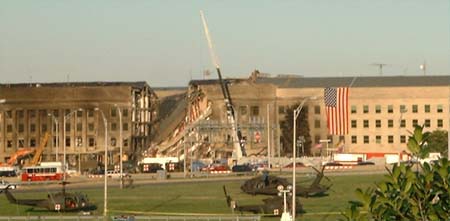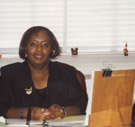| Maryland Newsline |
| Home Page |
Politics
|
| Marylander Who Survived Attack
Finds It Hard to Work
Maryland Newsline Thursday, Oct. 18, 2001 Series: Tragedies' Footprints DISTRICT HEIGHTS, Md. - Lynette Brown still finds stark reminders of the Sept. 11 tragedy all around her. In the books she refers to at work. "You go open a book, and there is all the dust on it"--dust from the disaster.
Tents for rescue workers outside the building don't help, nor do the men carrying machine guns, Brown says. “You can’t not think about it. ” More than a month after the terrorist attacks in New York and suburban Washington, Brown says she's still finding it hard to report to work each day, and to concentrate. She works at the Pentagon, as she has for 15 years. “If I wasn’t going to the Pentagon, I know that my anxiety level would be up, but it wouldn’t be as high as it is,” says the 40-year-old executive secretary. Brown was in the Pentagon when American Airlines Flight 77 crashed into it. She admits to having thought about possible terrorist attacks before, but not "at the top place, like the White House" -- or the Pentagon. "It’s almost like my security level is gone." She says memories from the Sept. 11 attack linger. You can "not think about it for a second," she says. But then, some tangible reminder of the disaster intrudes. She's not alone in her anxiety. Brown says she was walking out of the building recently, when she encountered a worker on his way home from a 13-hour shift. "He’s going home, and he’s whispering to himself, 'It’s really bad,' " she recalls. Her life has also changed in subtler ways. Brown’s phone rings a lot more now, she says. Her older sister calls more, and talking to her mother is now "an everyday thing." On Sept. 11, Brown started the day the way she normally does: She was up at 5 a.m. praying and thinking about how she would get her supervisor from an important meeting to his dental appointment on time. “I don’t remember if someone called me to tell me that someone had attacked the World Trade Center, but we were all [at work] in front of the television watching the event unfold. We were just in shock, saying this could happen to us. We were praying it wouldn’t.”At about 9:40 a.m., a Boeing 757 with 64 people on board smashed into the Pentagon. Officials say 125 people inside the Pentagon were killed, along with the 64 people on board the plane. To date, remains from 118 people have been accounted for. “I felt the building shake, and we heard a loud boom. We looked at each other and said, ‘Oh God, no.’ We heard people come out into the hallway and yell ‘fire ball!’ ” She'd find out later her office was about a 5-minute walk from the crash area. Brown gathered her purse and changed her shoes and recalls not turning off her computer, which she would have done under normal circumstances, since she works in a classified area. She grabbed the hand of a colleague who was new to the building and ran. As she was getting into her car to drive home to District Heights, Brown remembers praying, “I can’t leave Emma," a woman who commutes with her every day. Thankfully, when she looked around, the woman was standing beside the car. They left, as the building burned. “We stopped for a second just to look back. We were in silence going home.” Brown says she knew two of the people killed in the attack. She’s still dealing with questions surrounding their deaths, and the deaths of the others. “I question, 'Why innocent people?' " she says. "But in listening to the pastor, he says you can ask God that question. He will answer each question individually.” Copyright © 2001 University of Maryland College of Journalism Related story: Marylander Who Thought of Pentagon as 'Home' Fights Depression
|


